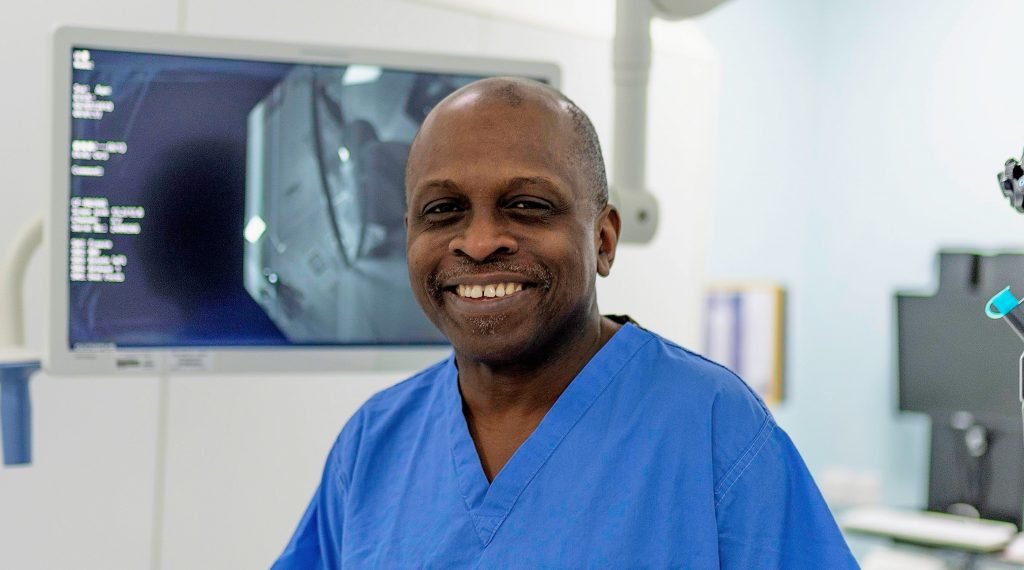The first UK clinical trial of an innovative artificial intelligence (AI) device is underway with the potential to save many lives lost to bowel cancer – with the first 500 patients now through the study.
Newcastle Hospitals is one of nine endoscopy units taking part in a ground-breaking study called COLO-DETECT. The study is trailing the use of GI Genius, a new AI device designed to help clinicians to identify polyps during colonoscopies (examinations used to detect changes or abnormalities in the bowel).
The study is being led by Professor Colin Rees, a consultant gastroenterologist at South Tyneside and Sunderland NHS Foundation Trust, professor of gastroenterology at Newcastle University and one of Europe’s leading experts in endoscopy (the procedure used to diagnose most forms of bowel cancer). He is working closely alongside Professor Linda Sharp, Professor of Cancer Epidemiology at Newcastle University.

In Newcastle, Dr David Nylander, a consultant gastroenterologist who is also the trust’s director of endoscopy and clinical director for the North of Tyne bowel screening programme, is leading the study.
16,000 deaths
Most bowel cancers develop from a type of polyp – called an adenoma – that becomes cancerous. It is important to find as many polyps as possible to decide whether they need to be removed, as this may prevent a polyp becoming cancerous in the future.
GI Genius integrates with existing colonoscopy equipment and analyses images from the camera in real-time. It highlights any areas it thinks may contain a polyp, these areas can then be inspected more closely to determine if a polyp is present and whether or not it should be removed.
Dr Chris Dipper, who is working closely with Dr Nylander on the study, said:
“Sadly, around 16,000 people die from bowel cancer each year, but it can be treated and sometimes cured if detected early.
“The technology we’re using in the COLO-DETECT trial highlights areas in the bowel that may contain a polyp. These areas can then be investigated more closely to tell us if the polyp needs to be removed.
“We hope that integrating the GI Genius into our current endoscopy practices will help to detect abnormalities in the bowel and improve outcomes for patients with bowel cancer.”
The £896,000 trial has been funded by Medtronic and will see nine NHS endoscopy units from across the country recruiting more than 2,000 patients over the next 12 months.
Professor Rees, said: “ Bowel cancer rates are very high in the North East – men in this region have the highest bowel cancer incidence rates in England with women also in the upper half of incidence rates.
“Sadly, survival rates for men and women in the North East are also amongst the lowest in the country and the survival rates in the UK are lower than in many other European countries. We want to reduce the number of deaths by diagnosing disease in the bowel before it even becomes cancerous and by finding cancer earlier.”
Supported by Sir Bobby
Patients participating in COLO-DETECT are being identified through another revolutionary bowel cancer project developed in this region.
Funded by the Sir Bobby Robson Foundation, part of Newcastle Hospitals Charity (£985,000), COLO-SPEED is a resource which gives patients from across the North East and Cumbria the opportunity to register to participate in bowel cancer research such as COLO-DETECT.
It includes the development of a novel digital platform, which provides essential tools to support research projects like COLO-DETECT and is used to collect data, feedback results and deliver ongoing patient and public engagement.
COLO-DETECT is the first major industry study attracted to the North East through the COLO-SPEED network. COLO-SPEED will also enable the project’s delivery more efficiently than would have previously been the case.
Lady Elsie said: “When my husband first launched this Foundation, his aim was to attract world-class cancer research to this region, which would then go on to help across the country and beyond.
“We’re so proud to see this starting with help from COLO-SPEED and I know our charity’s wonderful supporters will join me in wishing everyone involved all the very best. We all want to see research into this disease progressing as quickly as possible.”
Further information
About the Sir Bobby Robson Foundation:
Sir Bobby Robson launched his Foundation in 2008 and it has gone on to raise over £16 million to find more effective ways to detect and treat cancer.
Work funded by the Sir Bobby Robson Foundation directly benefits cancer patients in the North East and Cumbria and plays a significant role in the international fight against the disease – funding cutting-edge cancer treatment and innovative cancer support services and including the clinical trials of new drugs at the Sir Bobby Robson Cancer Trials Research Centre.
Sir Bobby described his charity as his “last and greatest team.” He had no idea how large his team would grow, or how much it would go on to achieve.
A fund within the Newcastle Hospitals Charity, the Foundation works within the NHS and in partnership with other leading charities and organisations. Teamwork was always very important to Sir Bobby.
For more information, please visit the Sir Bobby Robson Foundation website.
About Newcastle Hospitals Charity:
Our goal is to make a positive difference for the patients, staff and communities of the Newcastle upon Tyne Hospitals NHS Foundation Trust.
Your donations and involvement in our charity help us to make an impact for the 17,000 staff and the 1.72million patient contacts that take place through the Newcastle upon Tyne Hospitals NHS Foundation Trust each year.
Our charity supports initiatives that help to improve the health and wellbeing of our patients, people and wider communities through compassionate and innovative healthcare, education and research.
